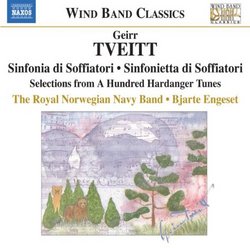| All Artists: Tveitt, Engeset, Royal Norwegian Navy Band Title: Tveitt: Sinfonia di Soffiatori; Sinforietta di Soffiatori; Selections from A Hundred Hardanger Tunes Members Wishing: 0 Total Copies: 0 Label: Naxos Original Release Date: 1/1/2008 Re-Release Date: 12/16/2008 Genres: Jazz, Special Interest, Classical Styles: Swing Jazz, Marches, Symphonies Number of Discs: 1 SwapaCD Credits: 1 UPC: 747313209576 |
Search - Tveitt, Engeset, Royal Norwegian Navy Band :: Tveitt: Sinfonia di Soffiatori; Sinforietta di Soffiatori; Selections from A Hundred Hardanger Tunes
 | Tveitt, Engeset, Royal Norwegian Navy Band Tveitt: Sinfonia di Soffiatori; Sinforietta di Soffiatori; Selections from A Hundred Hardanger Tunes Genres: Jazz, Special Interest, Classical |
Larger Image |
CD Details |
CD ReviewsAnother in Naxos's 'Wind Band Classics' Series J Scott Morrison | Middlebury VT, USA | 01/04/2009 (5 out of 5 stars) "One has to admire the creativity of the Naxos label's marketing strategy. They have embarked on various series of releases to cater to the interests of any number of niche musical interest groups -- e.g., lovers of Greek or Spanish music -- and here they issue yet another in their 'Wind Band Classics'. Conductor Bjarte Engeset, whom I knew from an earlier disc of Grieg piano transcriptions for orchestra Grieg: Norwegian Dances; Ballade; Slåtter, and the Royal Norwegian Navy Band do themselves proud. On this disc they play both original and transcription versions of music by that most tragic of Norwegian composers, Geirr Tveitt (1908-1981). I say tragic because this meticulous and creative composer was emotionally crushed when 4/5ths -- of the manuscripts of his compositions, over 300 opuses, most of them unpublished, were destroyed in a house fire in 1970. He composed very little and with much difficulty afterwards. But he had been prolific and a good deal of valuable music survives. On this disc we get two of his major works for band -- Sinfonia di Soffiatori and the Sinfonietta di Soffiatori -- and some short pieces for band, as well as a group of transcriptions for band by Stig Nordhagen of his orchestral works called 'A Hundred Hardanger Tunes'.
'Sinfonia di Soffiatori' ('soffiatori' are wind instruments) was a late work written for Minnesota's St. Olaf College Concert Band. In three movements, its language is dense, mildly dissonant and evocative of sounds of nature, particularly in the first and third movements. The second movement is based on folkdance rhythms and oft-repeated figures. III reminds one of the mysterious rhythms of nature heard in I. Unusually the work employs the usual wind band instrumentation plus a prominent part for harp. 'Prinds Christian Frederiks Honnørmarch' ('Prince Christian Frederick's March of Honor') is short ceremonial march with a powerful conclusion. 'Det gamle Kvernhuset' ('The Old Mill on the Brook'), a piece that I've even heard performed here in the USA, is a gentle three-minute song-form tone poem with a prominent lyrical trumpet solo. 'Hymne til Fridomen' ('Hymn to Freedom') is a short march with a catchy tune and tricky trumpet-and-horn chordal interjections supported by a swinging rhythm in lower brass and percussion. It has a lyrical middle section. 'Sinfonietta di Soffiatori' is a thirteen-minute suite each of whose five movements evokes some aspect of autumn. Its harmonic language is compact and somewhat dissonant. It is tuneful, rhythmically alive and engaging. The movements are, respectively, I. Intonation of Autumn, II. Memories of Summer, III. Funeral Fanfare, IV. Alpine Joy, and V. Final Song. One notes with pleasure the impeccable tuning and balance Engeset obtains from his Norwegian band. Finally, there are band transcriptions for nine of Tveitt's orchestral 'Hundred Hardanger Tunes'. Tveitt had arranged them in five large suites, of which four survive. (Hardanger is a district in southwest Norway with a rich tradition of folk music and its own musical instrument, the Hardanger fiddle ['hardinfele' in Norwegian] for which Tveitt wrote two concertos, sadly lost in the fire.) Titles include 'Bringing Strong Ale into the Mountains', 'The Song of the Snow Grouse', 'The Mountain Girl Skiing Downhill', 'Going A-Wooing', 'Tears and Laughter for a Boat', 'Hardanger Ale', 'The Brownie Dancing', 'Twilight', and 'Doomsday.' I particularly like 'Bringing Ale' and 'The Brownie Dancing', but all are brilliantly transcribed and beautifully played. Tveitt's music is easy to like. It has often been said that he was the twentieth-century heir of Grieg and this has some truth to it. His harmonies are undoubtedly more advanced but his simplicity and closeness to folk melody and rhythm is similar. Band music lovers in particular will find this disc rewarding. Scott Morrison" |
